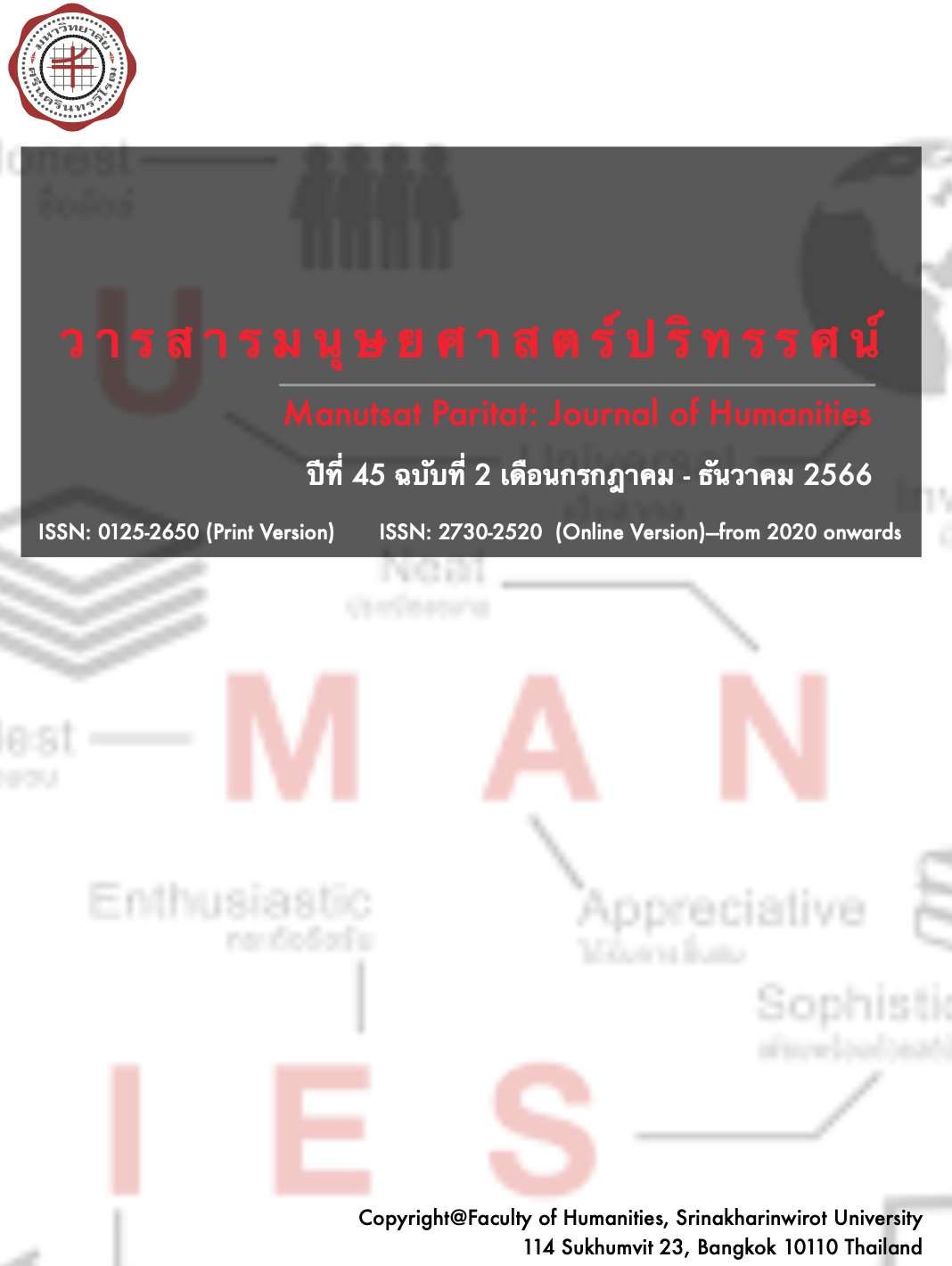A Comparison of Grammatical Errors Made by Thai EFL Undergraduate Students in Different Types of Essays
Main Article Content
Abstract
This study aimed to enhance the writing proficiency of Thai EFL students by investigating the types and causes of grammatical errors made by Thai EFL undergraduate students across various essay types. This research examined four types of essays: a balanced opinion essay, an explanatory essay, a point-counterpoint essay, and an analysis essay. Fifteen students participated in this study, and a total of 60 essays were collected for analysis. The findings revealed that sentence fragment errors were most prevalent in explanatory essays. The misuse of nouns was most frequent in balanced opinion essays while subject-verb agreement mistakes had the highest occurrences in point-counterpoint essays. Spelling errors were the most common mistake in analysis essays. In terms of the causes, these grammatical errors may have stemmed from a combination of interlingual and intralingual interference. This study emphasizes the importance of Thai EFL instructors thoroughly understanding the distinctive features of each essay genre, and equipping students with a solid grasp of grammatical rules. Specific attention should be given to recurring grammatical errors including sentence fragments, the use of nouns, subject-verb agreement, and spelling when teaching essay writing to Thai EFL undergraduate students.
Article Details

This work is licensed under a Creative Commons Attribution-NonCommercial-NoDerivatives 4.0 International License.
Any unauthorized copying, publication, reproduction or distribution of copyrighted works appeared in Manutsat Paritat: Journal of Humanities is an infringement of the copyright owners’ rights. To authorize the copying, publication, reproduction or distribution of copyrighted works to be appeared in other printed materials or any online media, please write to MPJHthaijo@gmail.com for permission.
References
Aisyah, R. N., & Rahmawati, F. (2019). An analysis on the students’ error in writing argumentative essay of the fourth semester students in STKIP PGRI Pasuruan. BRIGHT: A Journal of English Language Teaching, Linguistics and Literature, 2(2), 1-7.
Aknouch, L., & Bouthiche, H. (2022). Types and sources of Moroccan EFL students’ errors in writing: A study of error analysis. Arab World English Journal, 13(4), 67-79. https://dx.doi.org/10.24093/awej/vol13no4.5
Al-Jamal, D. A. (2017). Students’ fossilized writing errors: EFL postgraduates at Jordanian universities as a model. Journal of Al-Quds Open Universities for Educational & Psychological Research & Studies, 6(19), 1-17.
Aquino-Cutcher, A., Asplin, W., Bohlke, D., & Lambert, J. (2016). Final draft level 3. Cambridge University Press.
Arihasta, D. (2023). Non-English major undergraduate students’ difficulties in argumentative writing at Mae Fah Luang University Thailand. LLT Journal, 26(2), 732-748. https://doi.org/10.24071/llt.v26i2.6444
Ariyanti, A., & Fitriana, R. (2017). EFL students’ difficulties and needs in essay writing. In International Conference on Teacher Training and Education 2017 (ICTTE 2017) (pp. 32-42). Atlantis Press.
Asari, S., & Maruf, N. (2022). Organizational method of EFL undergraduate students’ academic essay writing with and without pre-determined topic. Budapest International Research and Critics Institute (BIRCI-Journal): Humanities and Social Sciences, 5(3), 25637-25648.
Bailey, S. (2011). Academic writing: A handout for international students (3rd ed.). Routledge.
Chaudary, F., & Moya, M. R. (2019). An examination and analysis of a learner’s errors from the perspective of a pedagogical grammar. In Proceedings of the 1st Applied Linguistics and Language Teaching (ALLT) Conference (pp.255-267).
Chuenchaichon, Y. (2022). An error analysis of written English paragraphs at lexical, syntactic, and paragraph levels made by Thai EFL non-English major students. 3L: Language, Linguistics, Literature, 28(2), 96-108. http://doi.org/10.17576/3L-2022-2802-07
Depega, A., & Jufrizal (2019). Grammatical errors committed by the English department students in writing an argumentative essay. In Eighth International Conference on Languages and Arts (ICLA-2019) (pp. 195-199). Atlantis Press.
Gass, S. M., Behney, J., & Plonsky, L. (2013). Second language acquisition: An introductory course. (4th ed.). Routledge.
Hyland, K. (2003). Second language writing. Cambridge University Press.
Jiang, Z. (2023). Analysis of errors in English argumentative essays written by Chinese university German majors. Journal of Education, Humanities and Social Sciences, 13, 131-139.
John, S. (2023). How to write an explanatory essay: Comprehensive guide with examples. https://essaypro.com/blog/explanatory-essay
Ka-kan-dee, M., & Kaur, M. (2014). Argumentative writing difficulties of Thai English major students. West East Journal of Social Sciences, 3(2), 56-70.
Kampookaew, P. (2020). An analysis of grammatical errors made by Thai EFL university students in an EAP writing class: Issues and recommendations. REFLections, 27(2), 246-273.
Kaweera, C. (2013). Writing error: A review of interlingual and intralingual interference in EFL context. English Language Teaching, 6(7), 9-18. ttp://dx.doi.org/10.5539/elt.v6n7p9
Khumphee, S., & Yodkamlue, B. (2017). Grammatical errors in English essays written by Thai EFL undergraduate students. Journal of Education Mahasarakham University, 11(4), 139-154.
Mackey, A., & Gass, S. M. (2005). Second language research: Methodology and design. Routledge.
Ozfidan, B., & Mitchell, C. (2020). Detected difficulties in argumentative writing. Journal of Ethnic and Cultural Studies, 7(2), 15-29. http://dx.doi.org/10.29333/ejecs/382
Patarapongsanti, A., Thongsan, N. C., Sukrutrit, P., Para, C., & Saphanuchart, N. (2022). An analysis of errors in business-oriented written paragraphs of the Thai EFL undergraduates. English Language Teaching, 15(7), 136-148. https://doi.org/10.5539/elt.v15n7p136
Richards, J. C. (1985). The context of language teaching. Cambridge.
Ristow, R. (2023). How to write a point/counterpoint essay. https://penandthepad.com/subpoint-essay-4971.html
Saengboon, S. (2017). English grammar and Thai university students: An insurmountable linguistic battle? English Language Teaching, 10(11), 22-36. http://doi.org/10.5539/elt.v10n11p22
Sermsook, K., Liamnimit, J., & Pochakorn, R. (2017). An analysis of errors in written English sentences: A case study of Thai EFL students. English Language Teaching, 10(3), 101-110. http://dx.doi.org/10.5539/elt.v10n3p101
Sompong, M. (2013). Error analysis. Thammasat Review, 16(2), 109-127.
Ueasiriphan, T., & Tangkiengsirisin, S. (2019). The effects of genre-based teaching on enhancement of Thai engineers’ technical writing ability. International Journal of Instruction, 12(2), 723-738. https://doi.org/10.29333/iji.2019.12246a
University of Texas System. (2012). Expository essay elements. https://jukebox.esc13.net/vgcdeveloper/TEW/handouts/TALAW_Handout_20.pdf
Walls, A. (n.d.). IELTS writing opinion essay. balanced https://alexwallselt.com/2021/11/03/ielts-writing-balanced-opinion-essay-2
Watcharapunyawong, S., & Usaha, S. (2013). Thai EFL students’ writing errors in different text types: The interference of the first language. English Language Teaching, 6(1), 67-78. http://dx.doi.org/10.5539/elt.v6n1p67
Westbrook, C., Baker, L., & Sawton, C. (2019). Unlock 3 reading, writing & critical thinking. Cambridge University Press.
Yilmaz, H., & Demir, N. (2020). Error analysis: Approaches to written texts of Turks living in the Sydney. International Education Studies, 13(2), 104-114.


